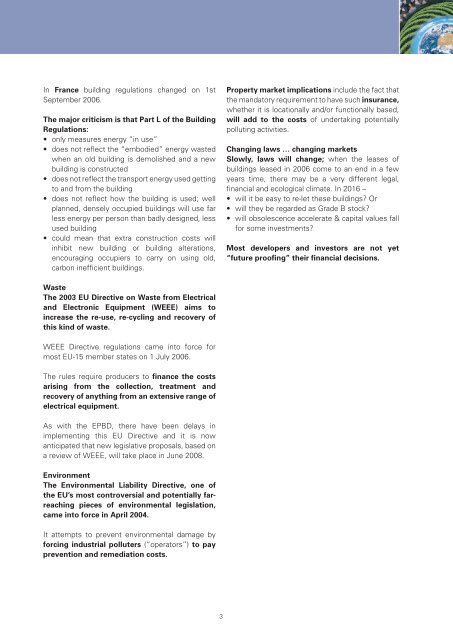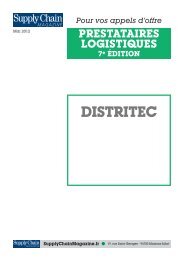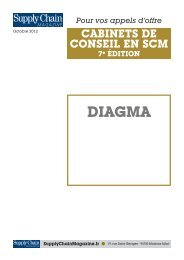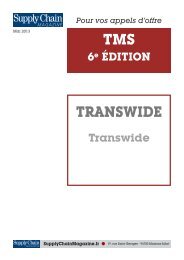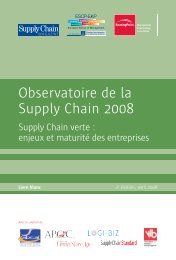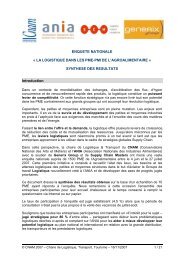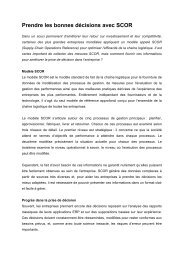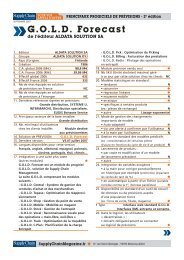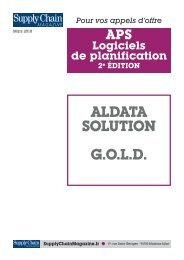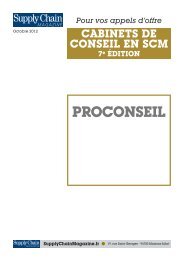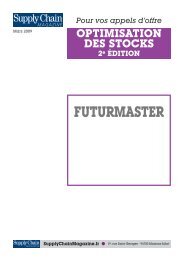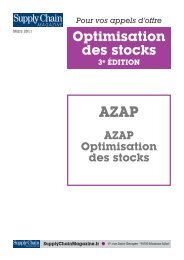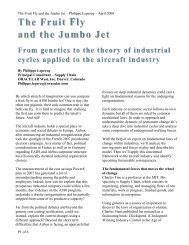European Property Sustainability Matters European Property ...
European Property Sustainability Matters European Property ...
European Property Sustainability Matters European Property ...
Create successful ePaper yourself
Turn your PDF publications into a flip-book with our unique Google optimized e-Paper software.
In France building regulations changed on 1st<br />
September 2006.<br />
The major criticism is that Part L of the Building<br />
Regulations:<br />
• only measures energy “in use”<br />
• does not reflect the “embodied” energy wasted<br />
when an old building is demolished and a new<br />
building is constructed<br />
• does not reflect the transport energy used getting<br />
to and from the building<br />
• does not reflect how the building is used; well<br />
planned, densely occupied buildings will use far<br />
less energy per person than badly designed, less<br />
used building<br />
• could mean that extra construction costs will<br />
inhibit new building or building alterations,<br />
encouraging occupiers to carry on using old,<br />
carbon inefficient buildings.<br />
<strong>Property</strong> market implications include the fact that<br />
the mandatory requirement to have such insurance,<br />
whether it is locationally and/or functionally based,<br />
will add to the costs of undertaking potentially<br />
polluting activities.<br />
Changing laws … changing markets<br />
Slowly, laws will change; when the leases of<br />
buildings leased in 2006 come to an end in a few<br />
years time, there may be a very different legal,<br />
financial and ecological climate. In 2016 –<br />
• will it be easy to re-let these buildings? Or<br />
• will they be regarded as Grade B stock?<br />
• will obsolescence accelerate & capital values fall<br />
for some investments?<br />
Most developers and investors are not yet<br />
“future proofing” their financial decisions.<br />
Waste<br />
The 2003 EU Directive on Waste from Electrical<br />
and Electronic Equipment (WEEE) aims to<br />
increase the re-use, re-cycling and recovery of<br />
this kind of waste.<br />
WEEE Directive regulations came into force for<br />
most EU-15 member states on 1 July 2006.<br />
The rules require producers to finance the costs<br />
arising from the collection, treatment and<br />
recovery of anything from an extensive range of<br />
electrical equipment.<br />
As with the EPBD, there have been delays in<br />
implementing this EU Directive and it is now<br />
anticipated that new legislative proposals, based on<br />
a review of WEEE, will take place in June 2008.<br />
Environment<br />
The Environmental Liability Directive, one of<br />
the EU’s most controversial and potentially farreaching<br />
pieces of environmental legislation,<br />
came into force in April 2004.<br />
It attempts to prevent environmental damage by<br />
forcing industrial polluters (“operators”) to pay<br />
prevention and remediation costs.


